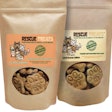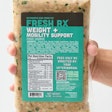
Premiumization of pet food, fueled by humanization of dog, cats and other pets, has boosted retail sales values consistently for years. Meanwhile, pet food sales volumes tended to grow more slowly or even level off in many developed markets, including the United States and much of Europe. The COVID-19 pandemic caused a boom in new pets, which helped increase pet food sales volume and value in these markets and others worldwide.
However, as inflation supplants the coronavirus in pet owners’ concerns, fewer people are looking for new pets. What’s more they may be concerned about the costs of pet food for the animals they have now.
Inflation of pet food prices
Nevertheless, sales value of cat and dog foods may be up in 2022, but inflation could account for a significant part of that increased spending on pet foods, reported Supermarket News. While NielsenIQ retail data reflect an increase in dog food and treats retail sales of 12.2% over last year, average unit prices for those products increased 14% in the same time period, one food distribution company representative said. Likewise, in the 52-weeks ended July 23, cat food and treats retail sales grew by 14.6%, but ices inflated 15.5%. Premiumization helped keep pet food sales values high, but some supermarket retailers are concerned about volume declining as prices continue to rise.
Supply chain disruptions persist
Prices continue rising even when pet food products aren’t on shelves. Some retailers told Supermarket News that supply chain disruptions have continued throughout 2022. In particular, value-priced pet foods and wet cat foods have had lower fill rates than retailers would like. A lack of value-priced pet food coupled with higher prices across the board may leave budget-minded pet owners with few options.

















